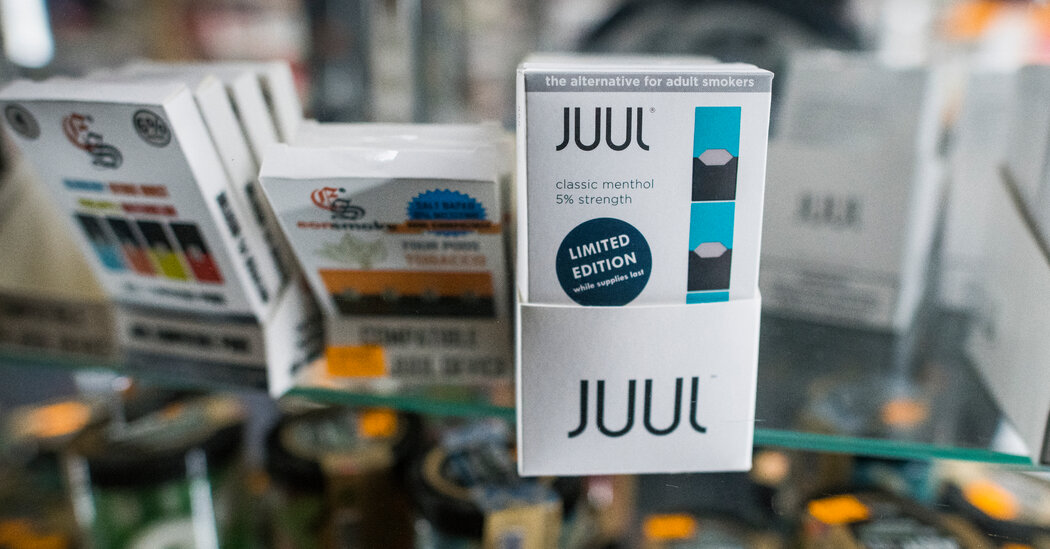
The Food and Drug Administration on Thursday ordered Juul Labs to stop selling e-cigarettes in the United States, saying the company had provided conflicting and insufficient data that prevented the agency from determining potential health risks of its products.
The company’s pods and cartridges are among the most widely sold electronic vaping devices. Does the F.D.A.’s ruling mean they are no longer for sale, and what are the alternatives for Juul users?
What’s the next step for Juul?
Early on Friday, Juul asked the U.S. Court of Appeals for the District of Columbia for an emergency stay on the F.D.A.’s order.
In its filing, Juul argued that the agency’s decision was motivated by political forces that sought to blame the company for the youth vaping crisis. The F.D.A. decided to ban Juul “after immense political pressure from Congress,” the filing states, “even though several of its competitors now have a larger market share and much higher underage-use rates.”
However, the F.D.A. did not cite underage use in its decision to ban Juul from the market. Rather, the agency said Juul had not provided sufficient evidence that its product prevents leaching of chemicals from the device to the nicotine vapor that users inhale.
Read More on Smoking and Vaping
If Juul were granted a stay, that could prohibit the F.D.A. from enforcing the sales ban on Juul products, pending an appeal of the decision to the court, the federal agency or both. This is not Juul’s only option at this time for a stay, and the company is trying all short-term options to keep selling its products while it begins a longer appeals process.
Will Juul users still be able to buy the company’s pods and e-cigarettes?
Some consumers were still able to buy Juul cartridges and the company’s tobacco and menthol-flavored pods as news of the ruling spread.
But the F.D.A. said on Thursday that retailers selling Juul products would be subject to enforcement action at some point, and ordered Juul to stop selling or distributing its products. Juul is no longer selling its products on its own website. Unless the company is granted a stay that allows it to keep its products on the market, the items will very likely be removed from shelves soon.
In its court filing, Juul said that the agency’s decision had “already had its intended effect,” indicating that some retailers had stopped selling Juul products.
Individual consumers would not be subject to penalties, the F.D.A. said.
Will I still be able to buy other e-cigarette products?
The F.D.A. is not seeking a blanket ban on all vape products. As part of its new regulatory authority over so-called electronic nicotine delivery systems, or ENDS, the agency has been reviewing applications for millions of products. It has already granted approval to 23 of them, including Vuse Alto, the market leader which is made by R. J. Reynolds, and several other products made by NJoy and Logic. (Applications for a million other products have been denied.)
As part of its review, the agency must consider whether a product is a viable alternative to combustible tobacco that can help cigarette smokers quit and whether the product’s benefits to public health outweigh its harm.
What are the best-selling e-cigarettes still on the market?
According to data from Nielsen, the top-selling vaping brand in the United States over the past 12 weeks was Vuse Alto, which earned $414 million in sales and had 33.4 percent of the overall e-cigarette market. A close second was Juul, with a 33-percent market share. None of the other brands came close to these two companies; the next best-selling brand, NJoy Ace, accounted for just 2.4 percent of the market.
How does the tobacco industry stack up against vaping?
The cigarette industry in the United States brought in about $99 billion in revenue last year, compared with $7.8 billion for vaping products like Juul, according to Euromonitor, a data research firm. But sales of tobacco are declining: Euromonitor estimates that cigarette sales will fall by about 13 percent through 2026, while vaping products are expected to grow by about 22 percent. Altria, the tobacco giant that took a 35 percent stake in Juul in 2018, had sales fall slightly last year, according to regulatory filings.
There are an estimated 30 million smokers of traditional cigarettes in the United States, a number that has been in decline for decades.
